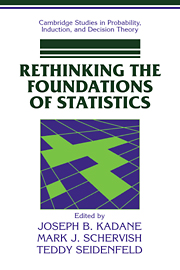Book contents
- Frontmatter
- Contents
- Introduction
- PART 1 DECISION THEORY FOR COOPERATIVE DECISION MAKING
- 1.1 On the Shared Preferences of Two Bayesian Decision Makers
- 1.2 Decisions Without Ordering
- 1.3 A Representation of Partially Ordered Preferences
- PART 2 THE TRUTH ABOUT CONSEQUENCES
- PART 3 NON-COOPERATIVE DECISION MAKING, INFERENCE, AND LEARNING WITH SHARED EVIDENCE
- Index of Names
- Subject Index
1.2 - Decisions Without Ordering
Published online by Cambridge University Press: 05 June 2012
- Frontmatter
- Contents
- Introduction
- PART 1 DECISION THEORY FOR COOPERATIVE DECISION MAKING
- 1.1 On the Shared Preferences of Two Bayesian Decision Makers
- 1.2 Decisions Without Ordering
- 1.3 A Representation of Partially Ordered Preferences
- PART 2 THE TRUTH ABOUT CONSEQUENCES
- PART 3 NON-COOPERATIVE DECISION MAKING, INFERENCE, AND LEARNING WITH SHARED EVIDENCE
- Index of Names
- Subject Index
Summary
ABSTRACT
We review the axiomatic foundations of subjective utility theory with a view toward understanding the implications of each axiom. We consider three different approaches, namely, the construction of utilities in the presence of canonical probabilities, the construction of probabilities in the presence of utilities, and the simultaneous construction of both probabilities and utilities. We focus attention on the axioms of independence and weak ordering. The independence axiom is seen to be necessary to prevent a form of Dutch Book in sequential problems.
Our main focus is to examine the implications of not requiring the weak order axiom. We assume that gambles are partially ordered. We consider both the construction of probabilities when utilities are given and the construction of utilities in the presence of canonical probabilities. In the first case we find that a partially ordered set of gambles leads to a set of probabilities with respect to which the expected utility of a preferred gamble is higher than that of a dispreferred gamble. We illustrate some comparisons with theories of upper and lower probabilities. In the second case, we find that a partially ordered set of gambles leads to a set of lexicographic utilities, each of which ranks preferred gambles higher than dispreferred gambles.
I. INTRODUCTION: SUBJECTIVE EXPECTED UTILITY [SEU] THEORY
The theory of (subjective) expected utility is a normative account of rational decision making under uncertainty.
- Type
- Chapter
- Information
- Rethinking the Foundations of Statistics , pp. 40 - 68Publisher: Cambridge University PressPrint publication year: 1999

